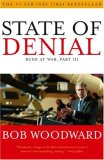Summary | Excerpt | Reviews | Beyond the Book | Readalikes | Genres & Themes | Author Bio

Critics' Opinion:
Readers' Opinion:
First Published:
Sep 2006, 576 pages
Paperback:
Sep 2007, 576 pages
 Book Reviewed by:
Book Reviewed by:
BookBrowse Review Team
Buy This Book
The Kennebunkport weekend was only one of many Thursday-to-Sunday August getaways at Camp Bush with breakfast, lunch, dinner, fishing, horseshoes and other competitions.
"I don't have any idea about foreign affairs," Governor Bush told Rice. "This isn't what I do."
Rice felt that he was wondering, Should I do this? Or probably, Can I do this? Out on the boat as father and son fished, the younger Bush asked her to talk about China, then Russia. His questions flowed all weekend -- what about this country, this leader, this issue, what might it mean, and what was the angle for U.S. policy.
Early the next year, after he was reelected Texas governor and before he formally announced his presidential candidacy, Rice was summoned to Austin again. She was about to step down as Stanford provost and was thinking of taking a year off or going into investment banking for a couple of years.
"I want you to run my foreign policy for me," Bush said. She should recruit a team of experts.
"Well, that would be interesting," Rice said, and accepted. It was a sure shot at a top foreign policy post if he were to win.
Bush raised an important issue with his close adviser Karen Hughes, then 43, a former television reporter who had worked for five years as his communications czar in Texas.
He said he needed to articulate why he wanted to be president. "You know, there has to be a reason," he said. "There has to be a compelling reason to run."
Hughes set out to come up with a central campaign theme. She knew Bush had three policy passions. First, there were the so-called faith-based initiatives -- plans to push more government money to social programs affiliated with religious groups. That enthusiasm was real, but it couldn't be the backbone of a presidential campaign.
Second, Bush cared about education. But America's schools are run at the state and local level. It would be tough to run for president on a national education platform.
Bush's third belief, in tax cuts, held promise. It could provide the rationale. The campaign autobiography Hughes wrote with Bush -- A Charge to Keep, released in November 1999 -- included 19 provisions about "education" and 17 entries under "taxes." "Faith-based organizations" are mentioned three times. The phrase "foreign policy" occurs twice, both in the context of free trade. There was a single reference to Iraq, no mention of Saddam Hussein, terrorists or terrorism.
During one of the 2000 primaries, Bush called Al Hubbard, a former deputy chief of staff to his father's vice president, J. Danforth Quayle, and one of a group of advisers the elder Bush had recruited to tutor his son on economic issues.
"Hubbard," Bush exclaimed. "Can you believe this is what I'm running on! This tax cut!"
Bush invited Richard L. Armitage, a former assistant secretary of defense in the Reagan administration, to join his team of foreign policy advisers. Armitage, 54, was Colin Powell's best friend. Barrel-chested with a shaved head, a weight-lifting addict who could bench-press 330 pounds, Armitage was a 1967 graduate of the Naval Academy. He signed on because he believed that the Clinton administration had no theory or underlying principle for its foreign and defense policies. It was ad hoc. The Republicans had a chance of getting it right. Armitage was an admirer of Bush senior, who he felt understood the necessity of a strong foreign policy tempered by restraint.
The U.S. military was preeminent in the world and could dominate or stabilize any situation, in Armitage's view. Clinton and his team had failed to develop adequate exit strategies for getting out of foreign entanglements such as Bosnia or Kosovo in the Balkans.
A big job for the next president, he thought, was no less than figuring out the purpose of American foreign policy. Rice's team called themselves the Vulcans. The name started out in jest because Rice's hometown, Birmingham, Alabama, known for its steel mills, had a giant statue of Vulcan, the Roman god of fire and metal. But the group, which included Paul Wolfowitz, the undersecretary for policy in Cheney's Pentagon, liked the image of toughness, and Vulcans soon became their self-description.
Excerpted from State of Denial by Bob Woodward. Copyright © 2006 by Bob Woodward. Excerpted by permission of Simon and Schuster Inc. All rights reserved. No part of this excerpt may be reproduced or reprinted without permission in writing from the publisher.





The Flower Sisters
by Michelle Collins Anderson
From the new Fannie Flagg of the Ozarks, a richly-woven story of family, forgiveness, and reinvention.

The House on Biscayne Bay
by Chanel Cleeton
As death stalks a gothic mansion in Miami, the lives of two women intertwine as the past and present collide.

The Funeral Cryer by Wenyan Lu
Debut novelist Wenyan Lu brings us this witty yet profound story about one woman's midlife reawakening in contemporary rural China.
Your guide toexceptional books
BookBrowse seeks out and recommends the best in contemporary fiction and nonfiction—books that not only engage and entertain but also deepen our understanding of ourselves and the world around us.